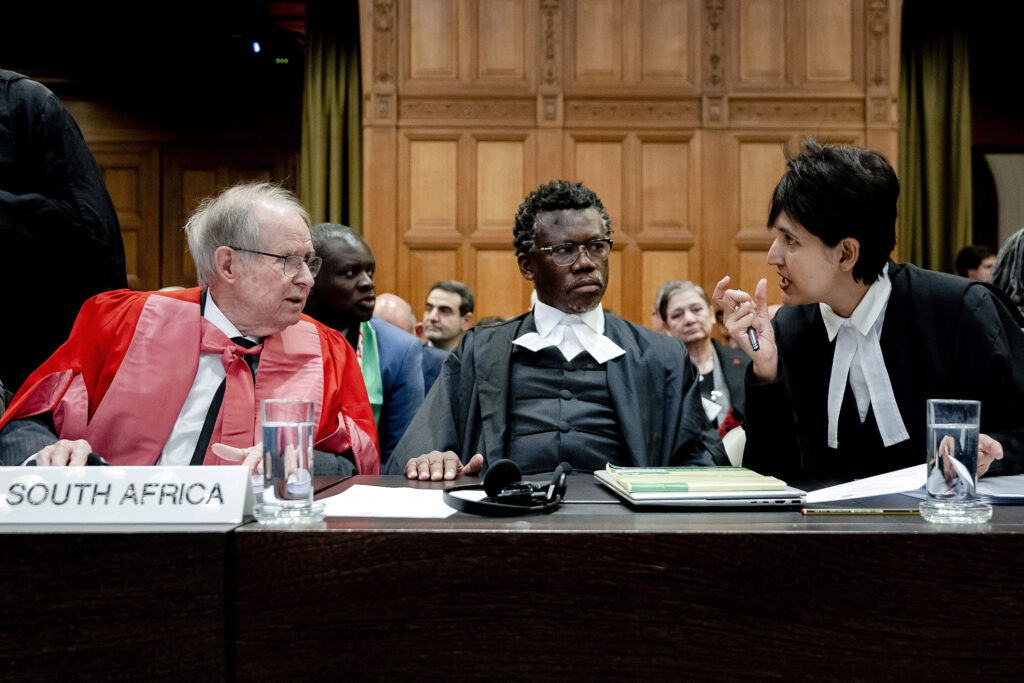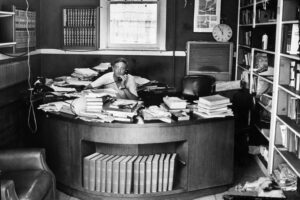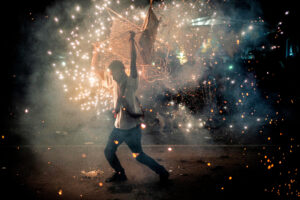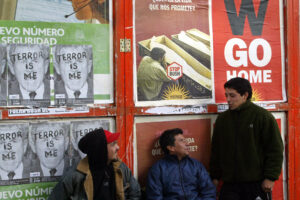Insurgent Legality

On December 29, 2023, South Africa filed an application at the International Court of Justice (ICJ) accusing Israel of violating the Genocide Convention for the actions it has taken in Gaza. Less than a month later, the court issued provisional measures requiring Israel to prevent genocidal acts, enable humanitarian aid, and preserve evidence. On May 24, it strengthened its order, directing Israel to halt its assault on Rafah. In The Hague, at the ICJ, South Africa’s representatives spoke with moral clarity and legal precision, asserting the principle that no state should stand above international law. The country appeared as a beacon of justice.
Yet South Africa’s renewed international moral authority sits uneasily alongside a domestic landscape scarred by mass impoverishment and frightening levels of elite corruption, which is now routinely referred to as political gangsterism. The situation is so bad that even the budgets of public hospitals have been subject to wholesale looting by politically connected criminal networks. In 2021, Babita Deokaran, a civil servant, was murdered after she blew the whistle on massive corruption in the public health care system. This was not an isolated incident. Assassinations are now a regular feature of South African life.
This dissonance defines South Africa’s present condition: A country still able to project the moral legacy of its liberation movement on the global stage is also increasingly unable to uphold that legacy at home.
The reaction from the United States and its allies to South Africa’s stance at the ICJ was swift and hostile. The US State Department dismissed the application as “meritless” and “counterproductive.” Britain’s foreign secretary called it “nonsense.” Israel went further, branding South Africa “the legal arm of Hamas,” a claim that was widely repeated by white liberal opinion in South Africa.
In South Africa the backlash was led by the Brenthurst Foundation, a Johannesburg-based think tank established by the Oppenheimer family, heir to one of the great and, of course, white mining fortunes. Brenthurst argued not only that the ICJ case was unethical but that it would damage the economy, isolate the country internationally, and amounted to siding with Hamas. One statement warned: “South Africa’s action at the International Court of Justice. . . will place South Africa among the pariahs.”
There was a fevered atmosphere among the white liberal commentariat. It was repeatedly claimed—without a shred of evidence—that Iran had bribed the ruling African National Congress (ANC) to take Israel to the ICJ and that South Africa was supplying weapons to Russia for its war with Ukraine. These kinds of allegations fueled the US far right’s longstanding hostility to the ANC, which in turn excited conservative whites in South Africa. The white-dominated former opposition party Democratic Alliance (DA) parroted a pro-US position too, reinforcing the idea that the DA and the ANC were poles apart ideologically.
Historical Continuities
There was no need to fabricate conspiracies to explain South Africa’s approach at the ICJ: It is deeply rooted in the history of the national liberation struggle. During apartheid, the ANC and progressive forces in unions, churches, and student organizations relied heavily on international forums to press their case. At the United Nations, apartheid was named a crime against humanity, giving legitimacy to the sanctions campaigns. International law and solidarity offered a counterweight to a domestic legal order designed by and for white supremacy.
During the struggle against apartheid, the ANC and the Palestine Liberation Organization (PLO) saw themselves as kindred liberation movements fighting regimes founded on conquest and racial domination. From the 1970s on, they frequently appeared together in international forums, most notably at the United Nations, where apartheid–South Africa and Israel were often named in the same breath. ANC cadres visited Palestinian refugee camps in Lebanon, while PLO representatives were regular guests at ANC conferences. The image of PLO Chairman Yasser Arafat and ANC President Oliver Tambo embracing on a public stage in 1992 became emblematic of their mutual recognition and shared struggle.
For the ANC, Palestine symbolized the unfinished business of global decolonization. Israel was formed in 1948, the same year the National Party came to power in South Africa and formalized apartheid. This coincidence gave rise to a strong sense that the fates of the two peoples were historically entwined: South Africa achieved its freedom late, and Palestine’s was still to come. Nelson Mandela’s remark in 1997 that “our freedom is incomplete without the freedom of the Palestinians” distilled this sentiment into a phrase that still resonates across South African political life.
These affinities were reinforced by the geopolitical realities of the Cold War. Israel had become a key partner of the apartheid regime, supplying arms, training, and intelligence when other channels were blocked. For liberation activists, this was further confirmation that the two systems were aligned in their dependence on racial domination and repression. By contrast, Palestinian solidarity groups were among the most steadfast supporters of the anti-apartheid cause, rallying against South Africa’s participation in global sporting and cultural events and campaigning for sanctions and boycotts.
There is also a strong sense in South Africa that its transition from apartheid, flawed as it has been, offers a possible way forward for Israel and Palestine. The Ugandan scholar Mahmood Mamdani has argued that South Africa’s transition was striking because “a settler minority has relinquished exclusive political power without an outright political defeat,” having recognized “the majoritarian character of the native population.” In South Africa, the settler-native stalemate was broken when the political community was re-founded on a democratic basis, even though there were deep inequalities. In Palestine, the legal and political architecture continues to manufacture permanent majorities and minorities, sustaining the impasse rather than breaking it.
Solidarity with Palestine has such widespread moral credibility in South Africa that many organizations on the left that are deeply hostile to the ANC nonetheless support the government’s position on Palestine. This includes Abahlali baseMjondolo, a powerful movement for the rights of the poor, the South African Federation of Trade Unions, and the National Union of Metalworkers of South Africa. And it is not only South Africa’s independent left that supports the government’s position on Palestine, but organizations like the Centre for Applied Legal Studies, Penny Appeal, and Gift of the Givers. The country has developed advanced human rights jurisprudence and a vibrant infrastructure of NGOs and lawyers to promote human rights through the courts. The most common target of this work has been the ANC government itself and the state it manages.
The Constitutional Court’s jurisprudence has been especially important. In 2000, in the landmark Grootboom case, the court affirmed that the right to housing meant more than freedom from eviction: It imposed a duty on the state to take “reasonable measures” to ensure adequate shelter for those in desperate need. In 2002, the court ruled in favor of the Treatment Action Campaign, requiring the government to make antiretroviral medication available to prevent mother-to-child transmission of HIV. In October 2025, the High Court ruled that the KwaDukuza Municipality near the city of Durban could evict members of the social movement Abahlali baseMjondolo only if certain conditions were met, including the availability of adequate basic services at proposed relocation sites. All three judgments signaled that rights on paper had to be made real in practice, and that the courts could be used as instruments of accountability for the most marginalized.
The same pattern can be seen in litigation on education, health care, and even access to water, through which activists and lawyers have secured rulings that compelled municipalities to meet basic obligations. These struggles were not only legal; they were driven by social movements, unions, and NGOs along with protests and political mobilization. It is this culture of insurgent legality—in which the state is often the target rather than the claimant—that shaped the lawyers who stood before the ICJ.
Adila Hassim, a South African of Indian descent known for her public-interest litigation on health and housing rights, opened with a searing account of Gaza’s devastation. Tembeka Ngcukaitobi, a Black South African, drew on his experience in constitutional and land-rights cases to set out the legal framework. John Dugard, a white South African and long one of South Africa’s most authoritative international lawyers, gave the case historical depth. All three lawyers came out of domestic human rights struggles. Together, their presence signaled that the initiative in The Hague was rooted in a tradition of challenging the state as much as representing it, and in a legal culture forged in struggles for accountability at home.
The Human-Rights Ledger at Home
If South Africa’s case at The Hague showed the strength of its legal culture, the situation inside the country reveals how fragile its democratic order has become. It is difficult to speak of the universality of rights abroad when so many are violated at home.
The crisis enveloping South Africa’s democracy is not just within the state. Operation Dudula, a militarized group that has been described as fascist, openly prevents migrants from entering public clinics and hospitals. The impunity granted to Operation Dudula is alarming because its actions are a direct assault on constitutional rights. The South African Bill of Rights guarantees access to health care and due process under the law, regardless of nationality. Yet the state has not restrained Dudula. On the contrary, its members often act with the tacit or open support of local police. This impunity is not new. Xenophobic pogroms erupted as early as 2008, when more than sixty people were killed and tens of thousands displaced. Further waves of violence followed in 2015 and 2019, targeting Asian and African migrants. Prosecutions have been rare, and the violence has become normalized.
Another disturbing reality has been the normalization of political violence. In the province of KwaZulu-Natal, assassinations have become a regular feature of local politics. Most of the killings result from struggles for money and power within the ANC, but grassroots activists operating outside of the party are also at risk. Abahlali baseMjondolo has faced repeated attacks from local party thugs. Its leaders have been assassinated, its settlements raided, and its members forced to go underground.
There is also a major crisis of governance. South Africa’s towns and cities are collapsing under the weight of corruption and neglect. Roads are crumbling, piles of rubbish rot on the streets, the water supply is unreliable, sewage spills into streets and rivers, and electricity cuts are routine. Public hospitals are overwhelmed, underfunded, and unable to deliver even basic care. The key driver of this crisis is massive corruption, now so entrenched that people commonly speak of a “mafia state.” And the government officials, auditors, and lawyers who fight this corruption are regularly assassinated.
Distortions and Delegitimization
If South Africa’s domestic crises complicate its claim to moral leadership, the international backlash to its case in The Hague reveals a different kind of distortion. From Washington to London, and from global think tanks to local white-dominated media platforms, there has been a strong effort to cast South Africa itself as an illegitimate actor on the international stage.
The hostility began before the war in Gaza, when South Africa decided to maintain a non-aligned position on the war in Ukraine, refusing to follow Washington and Brussels into confrontation with Moscow. Non-alignment is a longstanding commitment in South Africa’s foreign policy, but no doubt many older ANC members feel residual sympathy for Russia resulting from Soviet support for the anti-apartheid struggle. To the consternation of many in the West, there is an even stronger sympathy for Cuba, whose soldiers defeated the apartheid military in the Battle of Cuito Cuanavale in southern Angola in 1988.
The South African government’s refusal to line up behind the West in its support of Ukraine had already provoked outrage in white-dominated liberal media at home, where it was read as a turn away from the West and its democratic values. There was often a clear and strident demand that South Africa affiliate with the West and distance itself from all the West’s enemies, including South Africa’s partners in BRICS. But while these kinds of views are common among white elites, they have very little purchase among the Black majority, which has often expressed a very different critique. It is common to hear support for the government’s support for Palestine followed by an expression of sadness or anger that the same principles are not applied at home.
A New Confidence in the Global South
For many people around the world, the deeper meaning of South Africa’s case in The Hague lies in what it signals about the place of the Global South in the international system. International law has always been defined and enforced by the powerful. Former colonies were expected to abide by it, not to shape it. By bringing Israel before the ICJ, South Africa disrupted that pattern.
That disruption continued when South Africa and Colombia co-convened the Hague Group in support of Palestine. The initiative quickly drew support from Brazil, Turkey, Malaysia, Algeria, Cuba, Bolivia, and Namibia, among others, showing that the call for accountability now came from an emerging bloc of states asserting the legitimacy of international law from below. The Hague Group has become an important platform for coordinated diplomacy in support of international law and measures against Israel. It has also become a new node of political confidence in the Global South and marks a significant turn away from the long years of quiescence.
Human rights have always had a dual character: They can be instruments of domination, imposed selectively and enforced by the powerful, but they can also be instruments of resistance, claimed from below to restrain that very power. This is what the Kenyan professor of human rights Makau Mutua calls the “savage-victim-savior” narrative, in which the West casts itself as the universal guardian of rights and others as violators or passive beneficiaries. South Africa’s case at the ICJ disrupted this script by positioning a Global South state as the accuser rather than the accused, demanding universality in a system designed to enforce hierarchy.
For the Global South, the ICJ case and the Hague Group show that international law can be invoked from below as well as from above. The ICJ case is also a test of whether the multilateral system can still constrain power. If it fails, it will expose the limits of a system that has always struggled to treat all states as equal.
Now that South Africa has been joined in its case at the ICJ by several other countries, effectively rallying support for its position via The Hague Group, it is a lot less isolated than when it first took Israel to the ICJ. The fact that there is now growing international agreement with the view that Israel is committing a genocide in Gaza has also eased the pressure. At home, the Brenthurst Foundation has closed for reasons that are not clear, and the white-dominated media have retreated somewhat from their extreme pro-West position as condemnation of Israel’s actions has grown. As a result, there is a growing space for reasoned discussion.
The challenge for the world is whether it will allow international law to be genuinely universal or whether enforcement will continue to be selective. The contradiction, of course, is not unique to South Africa. The United States routinely invokes human rights to justify foreign interventions while maintaining Guantánamo Bay and shielding its own allies from accountability. This selective universalism underscores how moral language can serve power as easily as it can challenge it.
Nonetheless, South Africa’s action has forced this question of moral and legal consistency onto the global stage. What remains to be seen is whether the promise of rights as a shared human inheritance will be realized, or whether it will remain trapped in the antinomies that have long defined the international order.
The challenge for the South African government is whether it can uphold at home the principles it has affirmed at the ICJ. As a violent and corrupt political elite continues to damage the country and its people, that seems unlikely. Xenophobia, extreme corruption, regular assassinations, and collapsing infrastructure are all undermining the standing of the ANC to the point that it seems certain to lose the support of the electorate and soon its hold on state power. Corruption will continue to engulf the country. South Africa’s greatest diplomatic triumph in decades has thrown its deepest domestic failures into sharp relief.
Imraan Buccus, PhD, is research fellow at the University of Johannesburg’s Institute for Advanced Study (JIAS) and at ASRI (Auwal Socio-economic Research Institute).


